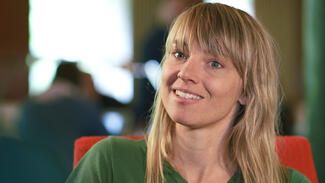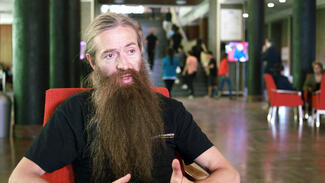
Anne Kjaer Riechert: Tech for Peace
In Berlin will das Stanford Peace Innovation Lab soziale Innovationen vorantreiben. Die ReDi School tut das ganz konkret und bietet Asylbewerbern in Deutschland mit IT-Kursen eine neue Perspektive.
"Scientists have always enjoyed sharing their ideas. But they have also always tended to be slaves of their career structure."
Video abspielen
Wann kommt endlich die Pille gegen das Altern? Sie kommt bald! Die Stammzelltherapie ist schon sehr weit fortgeschritten. Der Brite Aubrey de Grey, weltweit einer der führenden Köpfe in der Alternsforschung, hat auch klare Ansichten darüber, was Fortschritt ausbremst – und er erzählt, was ihm geholfen hat, die ausgetretenen Pfade des Denkens hinter sich zu lassen.
When will the anti-aging pill surface at last? Soon! Stemcell therapies have made huge progress. Aubrey de Grey, one of the world's leading gerontologists, also has a clear opinion what slows down science. And he tells what has helped him overcome the beaten path of thought.
Das Gespräch wurde am Rande der Tech Open Air 2017 in Berlin aufgezeichnet.
Jede Woche neu beim Stifterverband:
Die Zukunftsmacher und ihre Visionen für Bildung und Ausbildung, Forschung und Technik
Autor: Timur Diehn
Produktion: Webclip Medien Berlin
für den YouTube-Kanal des Stifterverbandes
If we misunderstand the nature of aging then we are at high risk of presuming that we can't do anything about it.
There are a number of stemcell therapies which are already in clinical trials, that will be applied to important diseases including aspects of aging. So the example I'd like to mention that is most easy to explain is Parkinson's disease where there is a particular type of brain cell type of neuron called a dopaminergic neuron which dies more rapidly than most neurons die. So most of us have lost maybe a quarter of those neurons by old age. Some of us lose that neuron a bit more quickly, maybe we have lost three quarters of them by old age, and people like that get Parkinson's disease because they are not making enough of this important chemical called dopamine. Stemcell therapies can fix that by putting in new precursor cells, cells that know what to do. They will divide and differentiate to create new dopaminergic neurons so that we have more dopamine. And this has been tried, and when it works it really really works incredibly well. No Parkinson symptoms anymore whatsoever even though all other therapies are discontinued. And at the moment we are talking about people who were treated 20 years ago when we didn't really know very much about how to do the therapy. Now we know much more and new clinical trials are in progress, and everyone is very optimistic.
We could somehow stop the body from creating damage in the first place or we could have the damage be created but we could repair the damage every so often so that the overall amount does not continue to increase. Now the first of those alternatives is impossible. Because it's just against the laws of physics. You know, cars are going to rust. People are going to rust. That's just how it is going to happen. But the second alternative, getting rid of damage after it has come into existance, it's very durable.
This whole approach of comprehensive repair of the damage that the body does to itself has a good chance of reaching a kind of decisive level of development within the next 20 years or so which means, of course, that we should be able to take people like you and me who will be, you know, let's say 40 or 50 or 60 or 70 at that point and actually fix them back up, not stop their aging at that biological age but actually repair them so that they are biologically 30 or 20 again.
In the first few years after I switched field without doubt the fact that I had an extensive experience in computer science was enormously beneficial to my ability to have, to look at things in a new way. I was able to take other people's data and identify different kinds of patterns in it if you like, different ways of thinking about it and come up with new ideas that people hadn't had before. That's really how I became prominent as a gerontologist in the first 5 years before I came up with the really big ideas about how to fix aging. It's also how I came up with those big ideas. So absolutely it made a huge difference. And of course I am not by any means the first person to have this experience. There are many areas of science which have seen great contributions from people who started their research careers in a completely different area. Perhaps the best example is molecular biology. The whole molecular biology was invented in the 1950s by a bunch of physicists.
It's always hard to get a new idea to be accepted how ever good the idea is. In fact, of course a famous German scientist Max Planck more than one century ago said it probably better than anyone said it. He said: "Science advances funeral by funeral." And of course what he meant was two things. He meant first of all it's difficult for anybody to get their head around someone else's new idea when it's a big change from what people thought before. And secondly, from the point of view of the scientific community, the older people are the people who are most influential. And of course the older people tend to be the ones who are responsible for creating the establised orthodox thinking. So when someone comes along with new thinking then those are the people who feel the most threatened and also unfortunately they are in the position to turn that feeling into resistance. So yes it's very hard to get new ideas accepted. It took me a long time to move this idea that we could develop preventative comprehensive maintenance for the body into the mainstream, maybe 10 years. And actually that's pretty quick by the standards of these things.
Because aging is so complicated people who have studied it have tended in general until now not to be technologists. They have been basic scientists. Basic scientists think in a very different way. They are all about finding things out for the sake of finding things out. Knowledge for its own sake. And any application of that knowledge that may have humanitarian benefit, no, that's just a bonus which is not their problem, so to speak which, means that when you have a field like biology of aging you have a problem. Because the biology of aging has transitioned from being so complicated and intractable and poorly understood that only basic scientists could look at it to suddenly being something that technologists can look at. And the people who are the most prominent and influential in the field are still the basic scientists. So when someone like myself comes along, you know, I'm a technologist and I have good ideas it takes a long time for the basic scientists to have the faintest idea what I'm even saying, let alone whether what I'm saying is right.
Scientists have always enjoyed sharing their ideas. But they have also always tended to be slaves of their career structure. People have to publish and been given credit for their ideas in order to be promoted and to get their next grant application funded and all that kind of thing. And, you know, sometimes that's very strongly against the culture of sharing ideas. So I don't think that tension is going to go away. It's inherant, it's endemic in the whole process of doing science.
Unlike almost any technology that has come along in the past this technology we will know that it's coming. In the next, I would say, probably 5 or 7 years we are probably going to see enough progress in the laboratory, in other words progress that's extending the longevity of mice for example so that everyone in the scientific community agrees that eventually we will get this to work for human beings. Now of course there will be a lot of disagreement within the scientific community with regard to how soon that will happen. But that doesn't matter. Because if it can happen then everyone is going to try to get it to happen as soon as possible. And that means that governments and industry, everybody, is going to be working together to not only make it happen as soon as possible but also to make it available as soon as possible. That means investing a lot of money into infrastructure and training medical personell and all the things that are going to be needed so that when these therapies are developed and they are available to anybody they can almost immediately become available to everybody. Now you may ask, well, what is the motivation to make sure that they are available to everybody? And of course there are two motivations. One of them is governments like to get reelected, and poor people have votes, too. So there will be huge political pressure to ensure that this investment is made so that these things can be provided. The second one is even more mercanery, so to speak, you don't even need to worry about the humanitarian imparity because you can just look at how expensive aging is. Today 90 percent of the medical budget of the western world goes on aging, one way or another. And that's just the direct costs. If you look at the indirect costs it's even bigger. If you think about all of the money that the elderly would be able to contribute to society if they just were still youthful, right? But of course they are not, they are just consuming money. If you think about the kids of the elderly, they are less productive than they could be because they are having to spend time looking after their sick parents. All of that will be gone. So it would be economically suicidial for any country to allow these therapies to be restricted by the ability to pay. They got to make sure that they are universally available because it would pay for itself so quickly.
People think it because they haven't had the right opportunity. Enough education, for example, to be able to make the most out of what life has to offer. And we need to fix that. And we will be able to fix it once we have all the prosperity that comes with nobody getting sick, and with all the other technological developments that are happening in automation and suchlike right now. So we will need and we shall definitely want to apply far more effort and resources to adult education, especially retraining, so that people have much more ability to go out there and just knock on the door, just do things with their lives. I know that there is no way ever, if I lived to the age of a million I would never ever get bored simply because I know what to do when I do get bored and I had to find new things to do. And that's how everyone will be quite soon.